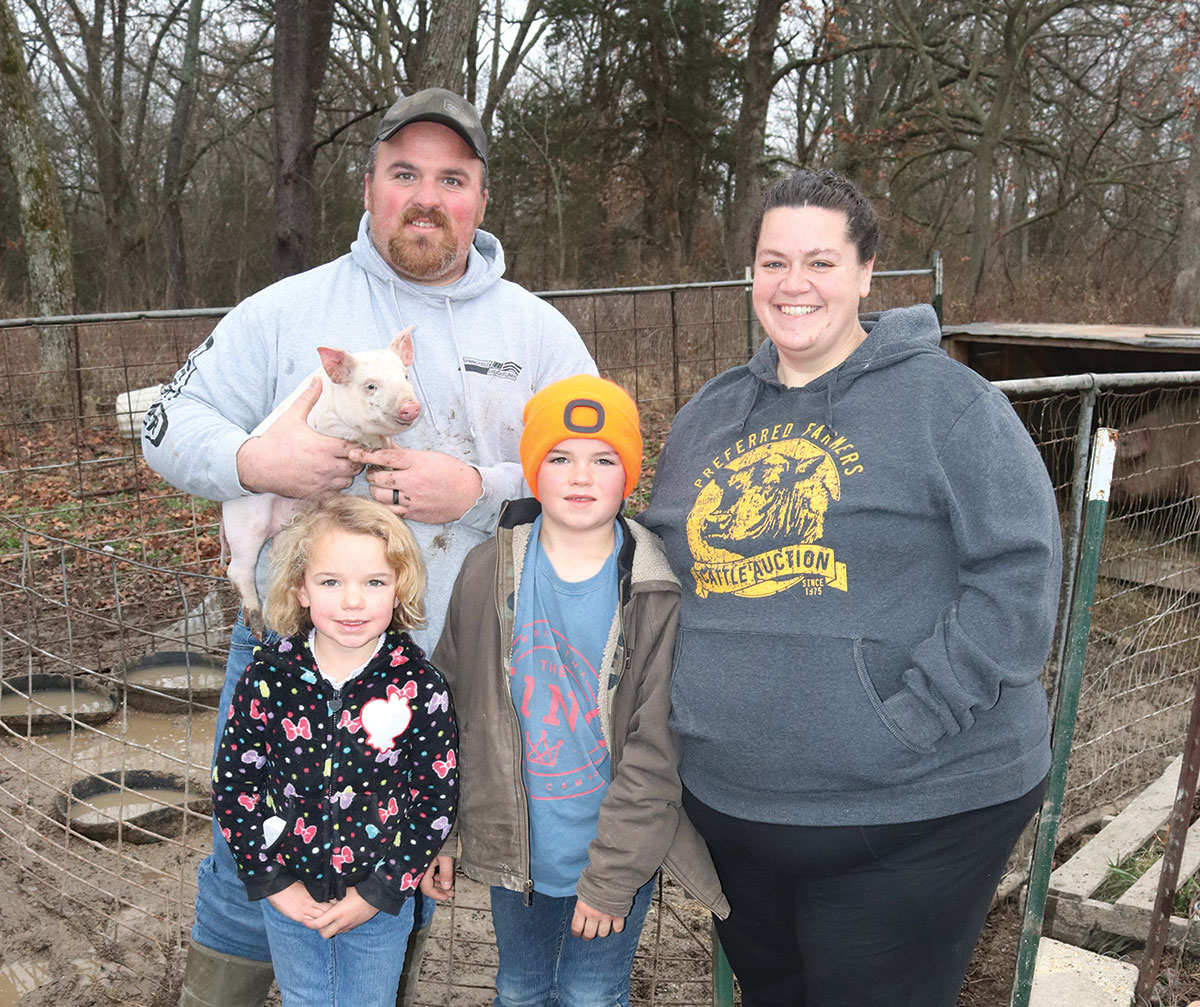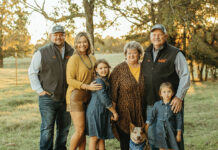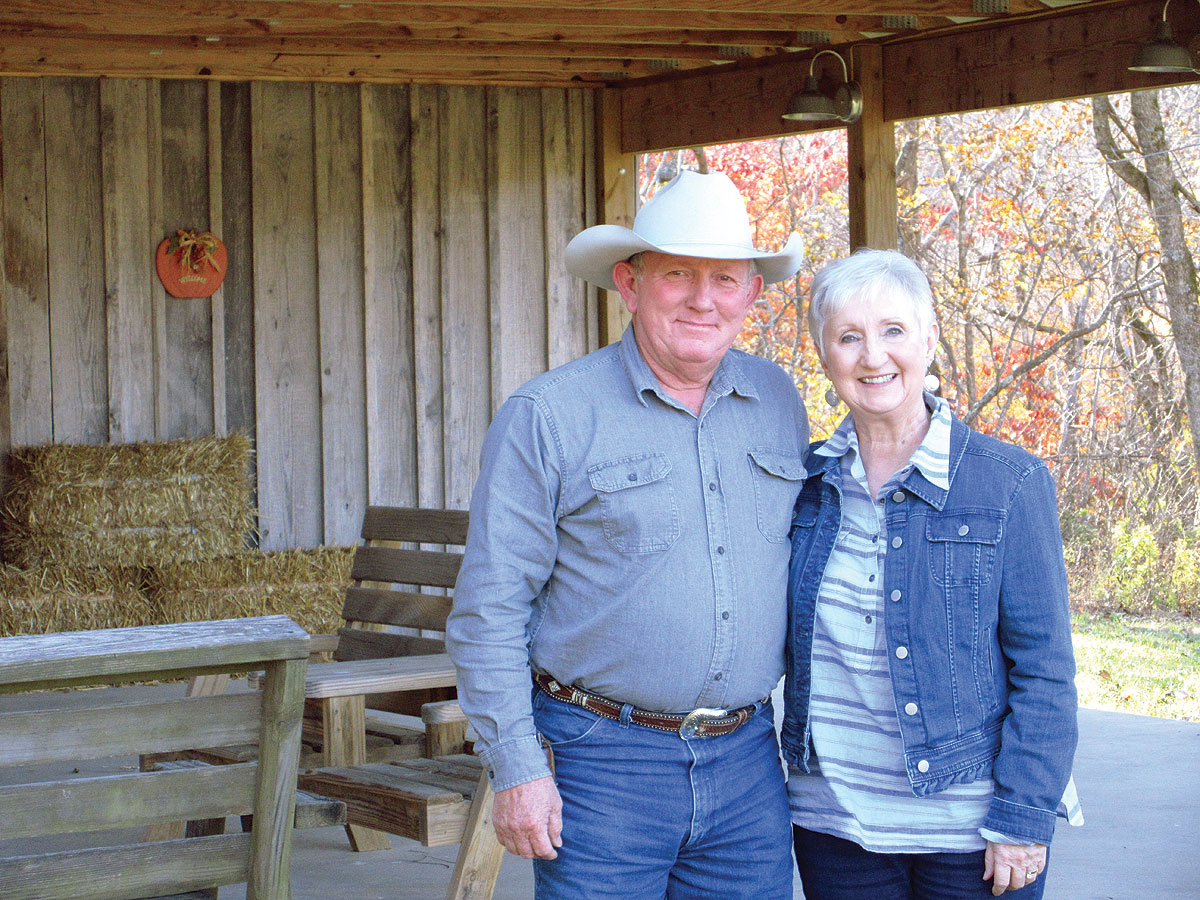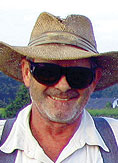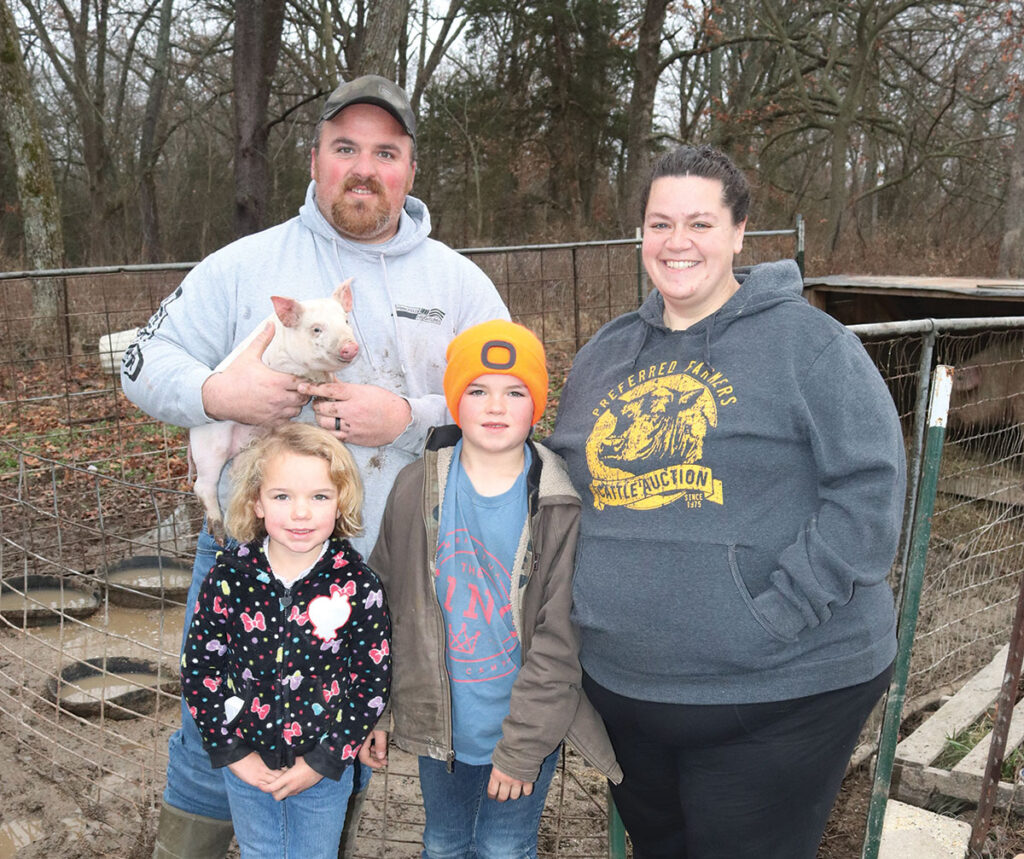
Family utilizes multiple species and sells directly to consumers
CONWAY, MO. – Sometimes, it isn’t about how much land you farm but how you farm your land.
Joe and Kelli Hernandez are making the most from their 40-acre farm with a multi-species operation and direct marketing of their farm products. They purchased the farm in 2019, and 2023 was their first year participating in farmers markets.
“We’re into a little bit of everything,” Joe said of Freedom Farms near Conway, Mo. “We raise broilers, layers, turkeys, are working on a crossbreed of pigs, and we have a handful of cows.”
Going directly to consumers with beef, pork, chicken and turkey made sense for the family.
“It’s about profitability,” Joe explained, adding they can make more money by offering cuts of meat, as opposed to selling the live animal.
The cattle herd is mixed and includes breeding females and steers, and a few Jersey steers used in the family’s beef program.
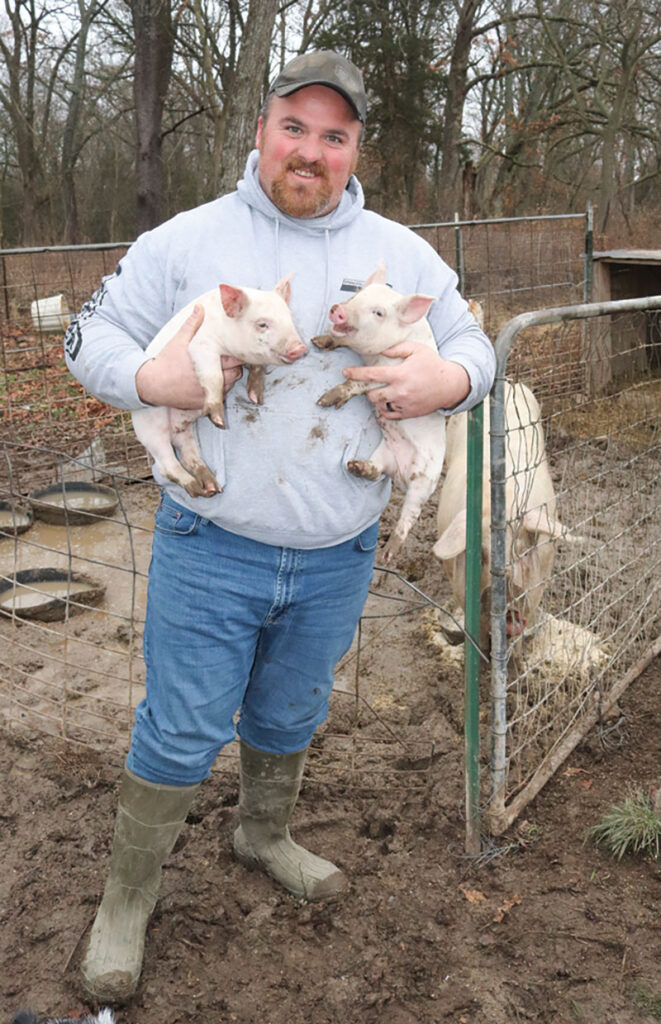
Because of their small herd, Joe and Kelli focus on the sale of individual cuts they sell at area farmers markets.
“Last year, we did two, but we can do four or five,” Joe said.
Kelli said they plan to add to their beef program in the coming year.
The family does not own a bull or use AI for their cattle operation. Instead, Joe and Kelli take their females to a bull owned by a friend, bringing them back to Freedom Farms once they are bred. Joe said not having a bull is safer for his family, which includes son Weston (8) and daughter McKenzie (5), or if they have visitors to the farm.
The swine operation offers wholes, halves and individual cuts. Kelli and Joe said demand for their pork exceeds the demand for beef.
“We have 14 feeders [pigs] right now, and we already have three and a half of those sold,” Joe said. “The rest will go through farmers market sales.”
Pigs for the pork program are from Yorkshire gilts and an Ossabaw boar.
“We have had some Ossabaw in the past, and we really like their history,” Joe said. “They come from a small island in Georgia and were there for 200 years. They would go for months with virtually no food and develop to build very large amounts of fat and store that fat. They also have a very dark red, heavily-marbled meat. Crossing them with a York, which is your large, commercial, high-production, low-fat pig, gives us enough lard to work with, but the pig isn’t obese,” Joe said. “We are shooting for that happy medium of fat, flavor and size because we can’t afford to feed them for two years.”
The pigs receive a roasted, non-GMO feed milled in Fortuna, Mo.
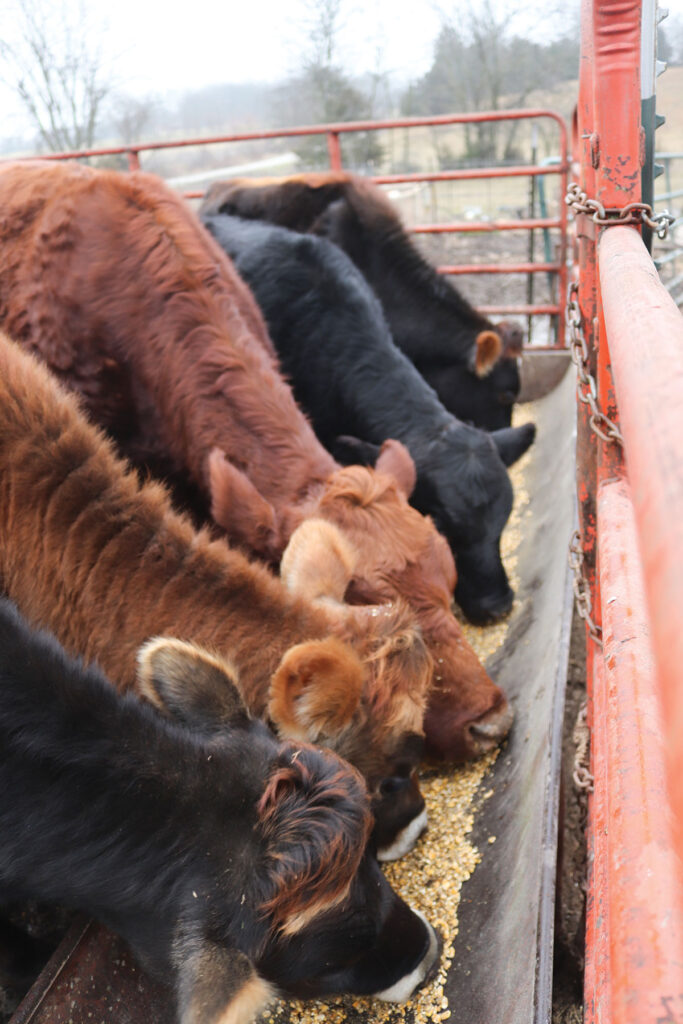
“We were scared to let them go free choice because we noticed if we try to push them, they get too fat. We have worked with our feed company to formulate a lower-fat, high-protein feed so I can feed them as much as I want and not generate a lot of fat. So far, it’s worked pretty well.”
Among the big sellers of their pork are nitrate-free bacon and uncured meats.
“We try to stay away from synthetic cures,” Joe said. “We will do some celery salt cures and a natural hickory cure.”
Their bacon sells out quickly, as to their jalapeno jack pork or beef brats.
Little is lost when pigs or cattle are processed.
“Organs sell really well for us,” Kelli said. “Also, unrendered tallow and lard. Liver sells well, and a beef heart was the first organ I sold at my first farmers market. We have a lot of questions about the organs.”
Beef bones are also packaged and sold.
“We sell everything but the oink with the pigs,” Joe added.
Broilers are a seasonal operation for the family. Using chicken tractors, they raise Cornish-cross broilers to a processed weight of between 4 and 6 pounds.
In 2023, they raised about 200 broilers, selling about 40 every two weeks at farmers markets, but plan on bumping it up to about 1,000 this year. The turkey crop was smaller than expected in 2023, but they did raise was quickly sold out.
Both the broilers and turkey are housed in mobile “tractors” that are moved around the farm daily. With the more birds this year, they plan to construct more tractors and move them further into the fields to aid in the fertilization of the pastures.
“In years past, when we ran chickens for ourselves, in the spring, you could tell where we had the chicken tractors because it was really green,” Kelli added.
Where forages are sparse in pastures, round bales are unrolled to help with seeding and raising the organic matter.
Joe does some custom haying and some work on shares, which helps provide hay for the family’s livestock operation.
All animals receive non-GMO feeds from the mill in Fortuna, Mo. The Hernandezes are also dealers of the feed.
“The non-GMO in the chickens has been big,” Joe said. “In the cattle, as long as they are grass-fed, that’s what people want.”
Kelli added that the cattle receive some grain, but all cattle are pasture-raised from birth to processing.
The Hernandezes work to raise their livestock as naturally as possible.
“There are so many people who are becoming educated on the effects of herbicides and dyes,” Joe said. “GMOs might not be the worst things in the world, but they might not be the healthiest. That’s our client base, and it seems to be growing every year. People just want to eat clean; they aren’t looking for organic or anything fancy, they just want to eat clean.”
“We get a lot of questions, especially with it coming out about lab-created meat,” Kelli added.
In addition to the livestock and poultry operations, Hernandezes offer maple and walnut syrup. The syrup is made from trees on the farm and processed there.
“There are actually 27 different trees you can make syrup from, and we have a lot of walnut, and it’s not high-grade walnut you would use lumber, so drilling a hole in it doesn’t create a problem,” Joe said.
They tapped five trees in 2019 and now tap around 25. It takes about 60 gallons of walnut sap to make a gallon of walnut syrup and about 40 more maple.
“Maple produces a lot more sap,” Kelli said, adding that one of their maple trees produces about 5 gallons daily. “The walnut varies from a half gallon to a gallon.”
The Hernandezes begin tapping in January and continue through February, depending on the weather conditions. Processing is simply cooking out the water.
This is the first year they will take their syrup to farmers markets. What they produced previously quickly sold out when posted on social media.
The family hopes to add sheep this year and offer farm-raised lamb to their customers, and other plans, including a commercial kitchen and canning classes for the public.
Being able to have a viable farm income is essential for the family.
“The farm has to pay for itself,” Joe said. “This year has been tight, and we are in the process of expanding because we have to have feed to feed out the pigs; we have never held anything this long, but it will pay off.”
Kelli and Joe also believe in investing in the next generation. The farm Joe and Kelli share with their children once belonged to Joe’s grandparents. “We want to invest in the future for the kids,” Joe said.
The farm isn’t the only thing expanding. The Hernandezes will welcome their third child in February.
“I mechanic for a living at Freightliner in Springfield and have been taking on a lot of side jobs, so the goal is for me to one day be able to stay here.”

